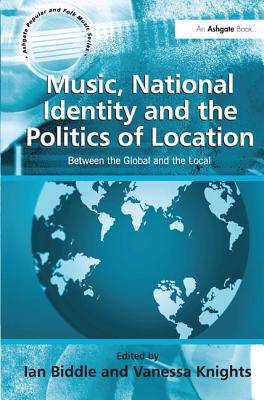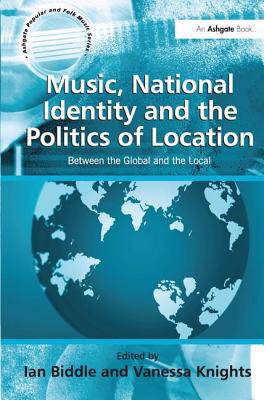
- Afhalen na 1 uur in een winkel met voorraad
- Gratis thuislevering in België vanaf € 30
- Ruim aanbod met 7 miljoen producten
- Afhalen na 1 uur in een winkel met voorraad
- Gratis thuislevering in België vanaf € 30
- Ruim aanbod met 7 miljoen producten
Zoeken
Music, National Identity and the Politics of Location
Between the Global and the Local
Vanessa Knights
€ 195,95
+ 391 punten
Uitvoering
Omschrijving
How are national identities constructed and articulated through music? Popular music has long been associated with political dissent, and the nation state has consistently demonstrated a determination to seek out and procure for itself a stake in the management of 'its' popular musics. Similarly, popular musics have been used 'from the ground up' as sites for both populist and popular critiques of nationalist sentiment, from the position of both a globalizing and a 'local' vernacular culture. The contributions in this book arrive at a critical moment in the development of the study of national cultures and musicology. The book ranges from considerations of the ideological focus of cultural nationalism through to analyses of musical hybridity and musical articulations of other kinds of identities at odds with national identity. The processes of global homogenization are thereby shown to have brought about a transitional crisis for national cultural identities: the evolution of these identities, particularly with reference to the concept of 'authenticity' in music, is situated within broader debates on power, political economy and constructions of the self. Theorizations of practice are employed after the manner of Bourdieu, Gramsci, Goffman, Gadamer, Habermas, Bhabha, Lacan and Zizek. Each contribution acts as a case study to characterize the strategies through which differing modes of musical discourse engage, critique or obscure discourses on national identity. The studies include discussions of: musical representations of Irishness; the relationship between Afropop and World Music; Norwegian club music; the revival of traditional music in Serbia; resistance to cultural homogeneity in Brazil; contemporary Uyghur song in Northwest China; rap and race in French society; technobanda from the barrios of Los Angeles, and Spanish/Moroccan raï. In this way, the book seeks to characterize the ideological configurations that help to activate and sustain hegemonic, amb
Specificaties
Betrokkenen
- Auteur(s):
- Uitgeverij:
Inhoud
- Aantal bladzijden:
- 272
- Taal:
- Engels
- Reeks:
Eigenschappen
- Productcode (EAN):
- 9780754640554
- Verschijningsdatum:
- 28/04/2007
- Uitvoering:
- Hardcover
- Formaat:
- Genaaid
- Afmetingen:
- 156 mm x 233 mm
- Gewicht:
- 611 g

Alleen bij Standaard Boekhandel
+ 391 punten op je klantenkaart van Standaard Boekhandel
Beoordelingen
We publiceren alleen reviews die voldoen aan de voorwaarden voor reviews. Bekijk onze voorwaarden voor reviews.











